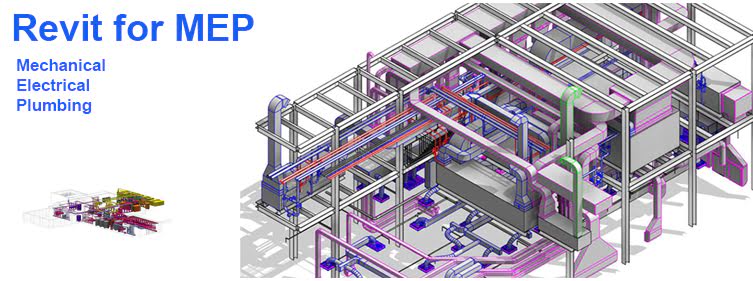Revit MEP

Course Information
Duration: 20 Hours
Fee: $1500
Description
This course has been designed to help aspirants understand the concepts and principles
of 3D parametric models of MEP system, created from engineering design through construction
documentation. The aspirants will be introduced to the user interface and the basic
HVAC, electrical, and piping/plumbing components that make Revit MEP a powerful
and flexible engineering modeling tool.
Topics Covered
1. Introduction to Revit MEP
- Understanding the Basic Concepts and Principles
- Opening the Interface
- Using the Shortcut Keys
- Interoperability of Revit MEP
- Setting the Configuration and Preferences
2. Starting with Revit MEP
- Starting a Project
- Setting Units
- Configuring other Global Settings
- Using Model Display Tools
- Saving a Project
- Closing a Project
3. Creating Building Envelope
- Understanding Walls and its Types
- Adding Wall Sweep and Wall Reveal
- Adding Door & Window
- Understanding Door & Window Properties
- Openings in Wall
- Working with Levels
- Understanding Level Properties
- Working with Grids
- Understanding Grid Properties
- Working with Reference Planes
- Setting a Work Plane
- Working with Project Views
- Introduction to Architectural Floors
- Creating Roof using Roof Tool
- Sketching a Ceiling
- Adding Rooms
- Calculating Room Values
- Adding Components
- Creating Stairs and Ramps
- Using Curtain System in a Project
4. Editing Tools
- Creating a Selection Set
- Moving and Copying Elements
- Trimming and Extending Elements
- Cutting and Pasting Elements
- Rotating, Mirroring, Matching, Aligning, Deleting, and Splitting Elements
- Pinning and Unpinning Elements
- Creating Group of Elements
5. Adding Spaces and Zones
- Space Modeling for Building Analysis
- Adding Color Schemes and Color Legends
- Creating Zones from Spaces
6. Creating an HVAC System
- Introduction to an HVAC System
- Adding Air Equipments
- Inspecting the Duct System
- Creating Duct Legend
- Generating HVAC Layouts
7. Creating an Electrical System
- Adding Electrical Fixtures
- Adding Power and System Devices
- Adding Lighting Fixtures
- Specifying the Electrical Settings
- Creating Power Distribution System
- Creating Circuits
8. Creating Plumbing System
- Specifying the Pipe Settings
- Placing Fittings
- Placing Pipe Accessories
9. Creating Fire Protection System
- Understanding Fire Protection System
- Creating Space Schedule
- Connecting the Sprinklers
10. Creating Annotations
- Working with Tags and Keynotes
- Adding Symbols
- Adding Dimensions and its Types
11. Massing and Families
- Understanding Massing Concepts
- Massing in Conceptual Design Environment
- Understanding the Work Sharing